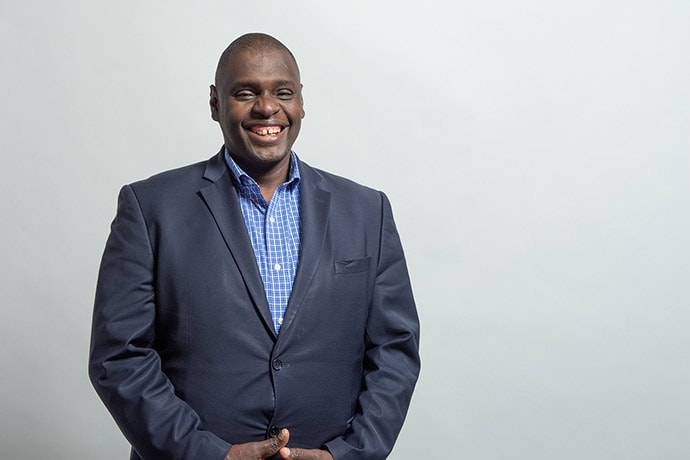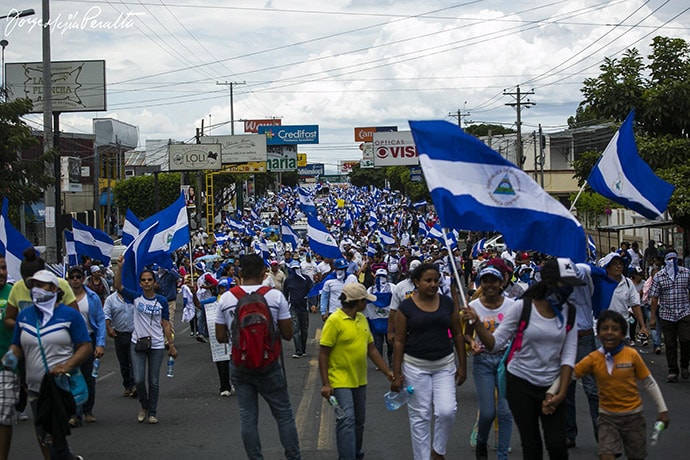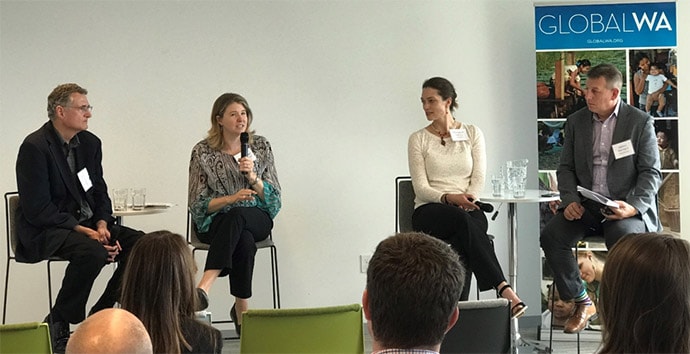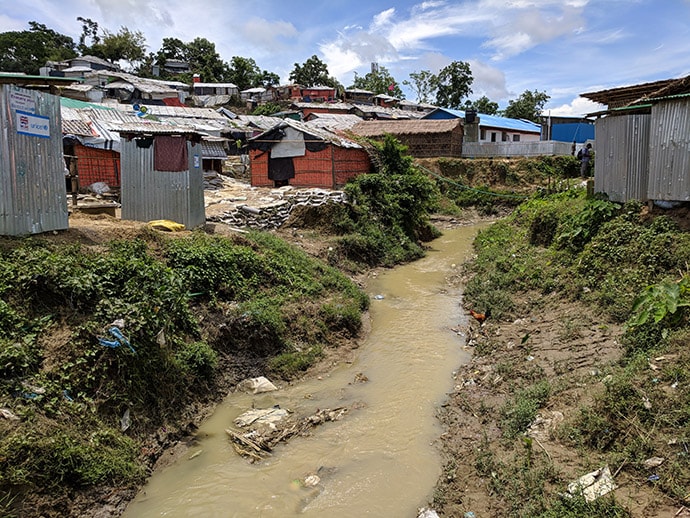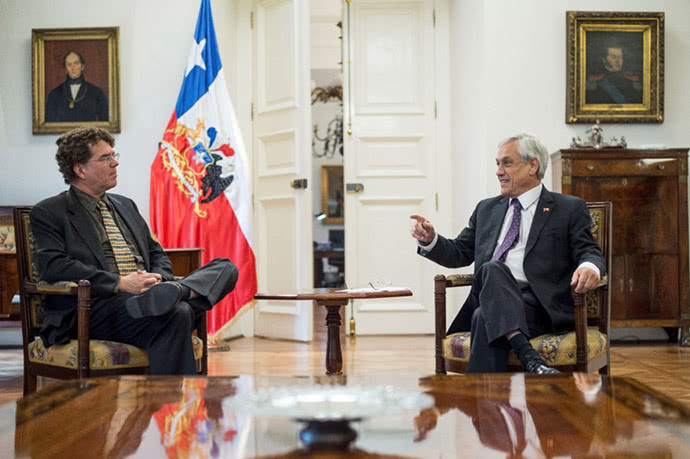Welcome to the September 2018 issue of the Global Washington newsletter.
IN THIS ISSUE
Letter from our Executive Director
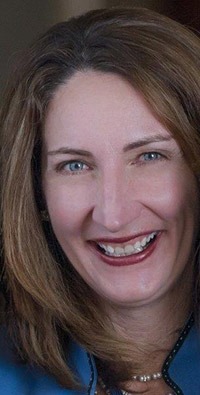
This year marks the 70th anniversary of the Universal Declaration on Human Rights, which recognizes the equal and inalienable rights of all as being “the foundation of freedom, justice and peace in the world.”
Beyond declaring our rights, we also have to be willing to stand up for them. This month we are focused on those brave individuals who have been willing to sacrifice everything in defending human rights – and what we as a community can do to help defend them.
In this week’s newsletter you’ll learn more about Siri May, the United Nations Program Manager for OutRight Action International, who has dedicated her career to defending the rights of LGBTIQ people globally. You’ll also find out how the World Justice Project’s Rule of Law Index helps serve as a diagnostic tool for activists to promote good governance, as well as a tool for governments to assess their own performance.
Earlier this week we hosted an event with Siri May, along with UW School of Law professor, Anita Ramasastry; Partners Asia Executive Director, Eileen Moncoeur; and Weber Shandwick’s VP of Social Impact, Radha Friedman. If you weren’t able to join us you can watch the video recording here.
At our annual conference in December, we’ll be revisiting all of the issues that we’ve been discussing throughout the year – from the refugee crisis and global health, to clean water and education, to food security and equitable access to finance. Also, I’m thrilled to announce that Sarah Hendriks, the Director for Gender Equality at the Bill & Melinda Gates Foundation, will be an additional keynote speaker for the conference.
The Early Bird pricing for our conference ends in one week – Sept. 20th – so sign up today to get the discount.
I hope to see you there.

Kristen Dailey
Executive Director
Back to Top
Issue Brief
Defending the Defenders: How the International Community Protects Human Rights Defenders
By Ulrike Hoessle

Berta Cáceres, human rights defender. Photo by coolloud via Flickr (CC BY-NC-ND 2.0).
“I am always thinking about being killed or kidnapped. But I refuse to go into exile. I am a human rights fighter and I will not give up this fight.”
– Berta Cáceres, cited by Amnesty International
Berta Cáceres, a human rights defender, indigenous leader, and environmental activist, knew the danger of her struggle against hydroelectric dams on the Gualcarque River in Honduras. She faced near-constant harassment and intimidation for her activities – until March 2016, when an armed gang entered her home and assassinated her. A year and a half later, an international team of lawyers issued a report implicating the leadership of the dam development company, and in March of this year, an executive from the company was arrested on charges of being an “intellectual author” of the crime – charges the company disputes.
The Deadliest Year for Human Rights Defenders
The UK-based watchdog Global Witness has called Honduras the deadliest country in the world to be an environmental activist. Sadly, Berta Cáceres’ case is not unique, and violence against human rights defenders goes far beyond environmental activism. The issues human rights defenders are fighting for are as multifarious as women’s rights, political, social, economic and cultural rights, LGBTIQ people’s rights, and the rights of children.
According to the recent Amnesty International report, Human Rights Defenders Under Threat – A Shrinking Space For Civil Society, about 3,500 human rights activists have been murdered worldwide since the U.N. General Assembly adopted the Declaration on Human Rights Defenders in 1998. And the numbers are increasing. More than 300 activists were murdered in 2017, and it was the deadliest year for environmental and indigenous activists, transgender people and human rights defenders in Colombia.
A Year of Human Rights Milestones
2018 is a special year for human rights, as it marks three important milestones:
The Declaration on Human Rights Defenders is a landmark in human rights’ history. It acknowledges that our freedoms depend on those who would fight for their protection. The Declaration has not only played an important role in affirming the right to defend human rights, it has also outlined the duties of states in this regard. As such, it legitimized the work of human rights activists and formed the basis of key protection mechanisms, such as national and regional guidelines for the protection of human rights defenders.
Since the Declaration was proclaimed by the United Nations General Assembly in Paris on December 10, 1948, the international community has taken further steps to celebrate, protect and recognize human rights defenders. For example, December 9 is now officially recognized as the International Day of the Human Rights Defender, and since 2000 a UN Special Rapporteur reports on the status of defenders globally.
Emergency Hotlines, Grants, and Non-Violent Accompaniment
Due to the increasing violence against human rights defenders, non-profits whose work defends the defenders are more important than ever. In 2017, Amnesty International launched an international campaign called Stand up for the Brave, which features human rights activists all over the world – from those who fight for transgender rights in Finland, to women’s rights in Saudi Arabia and Pakistan, to political rights in Bahrain.
Another organization, ProtectDefenders.eu, established a 24/7 emergency helpline and a temporary relocation fund for human rights defenders who may be facing immediate risk. The Urgent Action Fund – For Women’s Human Rights also maintains an open, online application process for rapid security grants.
Other groups increase the capacity of human rights activists and their organizations. Peace Brigades International sends international volunteers directly to conflict areas to non-violently accompany and protect activists. The World Organization Against Torture helps mobilize public opinion to counter abuses of power, while Protection International helps defenders develop security and protection strategies.
Technology Aids Protection of Human Rights Defenders
Information and Communication Technology is sometimes used by governments or corporations against human rights defenders to restrict, monitor or manipulate their mobile phones, computers and internet access. At the same time, these technologies enable defenders to gather, analyze and disseminate data locally and internationally about human rights abuses and allegations of abuse. There are multiple useful tools that protect them and facilitate their work.
Front Line Defenders assists activists in securing their computers and phones, in co-operation with the Berlin-based Tactical Tech, digital protection through security-in-a-box with open-source guides and tools available in 17 languages. Additionally, Front Line Defenders provides regional digital security training programs and consults with other human rights organizations to address changing digital security concerns.
The Geneva-based non-profit, Huridocs has also developed several data management systems, such as Uwasi, to publish documents; OpenEvsys, to understand patterns of human rights violations; and Casebox, to manage case documents securely.
While all of these tools were designed to support human rights defenders, their use is not without challenges. For example, sensitive data may require additional security, technology may not be appropriate to specific regional contexts, languages not written in Latin script may be incompatible, and the discontinuation of software tools can necessitate the transfer of huge amounts of sensitive data from one provider to another.
Human Rights Defenders’ Crucial Work for Just and Inclusive Societies
Human rights defenders, such as Berta Cáceres and many others who have been threatened or killed, are the safeguards of liberal democracies. They play a vital role in shaping societies towards more tolerance, respect and inclusion, the bedrock of healthy democratic society. Human rights and their defenders form the core of a just society. Without them, there can be no sustainable development, no peace, and no hope of a dignified life for everyone.
***
The following Global Washington members are working to support and defend human rights activists around the globe.
Breakthrough
Breakthrough is a global human rights organization working to drive the culture change needed to build a world in which all people live with dignity, equality, and respect. Working out of centers in the U.S. and India, Breakthrough uses a potent mix of media, arts, and tech to reach people where they are and inspire them to take bold action to challenge the status quo. The organization often views the most crucial issues of our time through the lens of gender, because it believes that promoting equality for all genders is a pathway to promoting the human rights, and the humanity, of all people. Since 1999, Breakthrough has also worked to promote immigrant rights, racial justice, and the rights of people living with HIV/AIDS.
Outright Action International
As the leading US-based non-profit fighting for human rights for LGBTIQ people globally, OutRight Action International advances safety, dignity, freedom and equality in places where LGBTIQ people face extreme violence, discrimination, and persecution. OutRight documents human rights violations, supports grassroots activists on the frontlines, and holds governments accountable at the United Nations and beyond. For 28 years, OutRight has been working to change hearts, minds and laws all over the world.
Partners Asia
Partners Asia supports emerging leaders and community-led initiatives to improve the lives of the most vulnerable people in Myanmar and along its borders: ethnic minorities, displaced populations, women, children, LGBTQIs, and students.
World Justice Project
The World Justice Project is an independent, multidisciplinary organization working to advance the rule of law around the world. Effective rule of law reduces corruption, combats poverty and disease, and protects people from injustices large and small. It is the foundation for communities of peace, equity, and opportunity—underpinning development, accountable government, and respect for fundamental rights.
Back to Top
Organization Profile
World Justice Project
By Joanne Lu
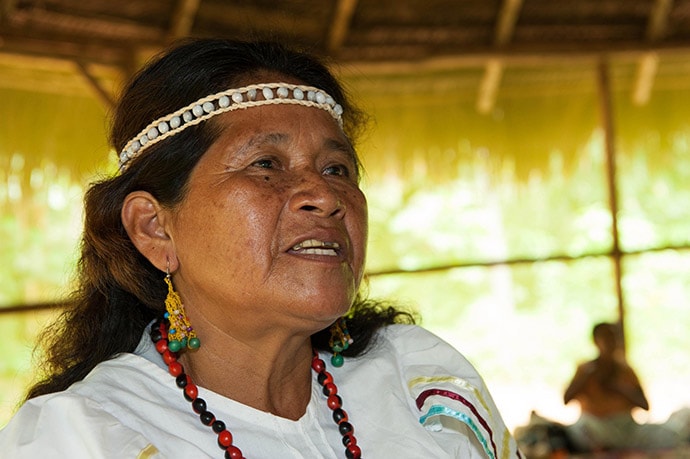
Ema Tapullima, the leader of the Amazon village Puerto Prado in Peru, wants future generations to be able to benefit from the native medicinal plants and animals in the rainforest that she grew up with.
Photo credit: Deborah Espinosa/WJP
Rule of law is the cornerstone of society. Though it’s not recognized, understood or appreciated enough, according to the World Justice Project, it is essential for development and human rights.
Bill Neukom, Microsoft’s first general counsel, was the president of the American Bar Association when he founded the World Justice Project in 2006. It began as a presidential initiative and evolved after his tenure into the independent nonprofit it is today, with offices in Washington, D.C., Seattle, Singapore and Mexico City.
The idea for the organization sprang from Neukom’s growing appreciation for rule of law as he traveled around the world for Microsoft and saw firsthand how important it was for development. Yet, not many people were working to promote it. There wasn’t even a clear definition for the term, as many people used it to mean many different things.
So, that’s where the World Justice Project began, by defining rule of law with four principles:
- Accountability – Do mechanisms ensure that no one is above the law, including the government?
- Just laws – Are the laws clear, publicized, stable, just and applied evenly? Do they protect fundamental rights?
- Open government – Is the process for enacting, administering and enforcing laws accessible, fair and efficient?
- Accessible & impartial dispute resolution – Is justice delivered in a timely manner by competent, ethical, independent and neutral parties? Do they have adequate resources and reflect the makeup of the communities they serve?
“The principles were our attempt at defining rule of law in a way that can be universally applicable around the world, not just to a specific form of government. You can have features of rule of law anywhere, at all levels of development and even beyond democracies,” says Matthew Harman, director of communications at the World Justice Project.
But just defining rule of law wasn’t enough. As Microsoft founder Bill Gates once said, “If you want to improve the rule of law, you need a way to measure it.” So, they decided to do just that. They settled on eight measurable outcomes, which they call factors – constraints on government powers, absence of corruption, open government, fundamental rights, order and security, regulatory enforcement, civil justice and criminal justice. In addition, they added one immeasurable outcome: informal justice, which is the role of traditional, tribal and religious courts as well as community-based systems in resolving disputes.
Then, based on that framework of factors, the World Justice Project developed extensive household and expert surveys to measure rule of law in countries every year. The first WJP Rule of Law Index published in 2010 looked at 35 countries. This year, it looked at 113 countries. The next edition will look at 125.
To score each country, the World Justice Project conducts 1,000 household surveys per country that include both perception and experience questions, such as “How safe do you feel walking in your neighborhood at night?” (perception) or “How many times in the last three years has your house been broken into?” (experience). The data collected from these household surveys constitute half the country’s score. The other half is from four types of expert surveys: civil and commercial law, criminal justice, labor law and public health. When household perceptions are swayed too much by politics or media, these expert surveys serve as a balancing mechanism. For example, they’ve found that when a government conducts an anti-corruption campaign, people tend to think there’s more corruption in the country, because the issue is all over the news. In such a case, experience questions and expert surveys keep the country’s corruption score true to reality.
According to Harman, the annual Index is a labor-intensive, time-intensive and money-intensive product. No one else, he says, is measuring rule of law this comprehensively using only primary data. And it has paid off.
“We are considered the leading source of original data on the rule of law,” Harman says.
Transparency International’s Corruption Perceptions Index, for example, utilizes the WJP’s Rule of Law Index’s corruption scores as a core data source, as do many businesses and governments.“The index is supposed to be a diagnostic tool that activists can use, but so can governments to get a good look at their own performance along these lines,” Harman explains. “It’s not intended to shame and blame anybody.”
After years of adding countries and refining the methodology, Harman says the 2018 Index, published on January 31, was the first time the World Justice Project was able to confidently compare year-on-year trends, and this is what they found:
Human rights is on the decline. Seventy-one out of 113 countries’ fundamental rights score dropped. The U.S. was among them primarily because of an increase in discrimination. Checks on government powers was the second steepest decline, with 64 countries dropping.
Overall, Venezuela remained at the bottom of the rule-of-law rankings, while Denmark, Norway and Finland remained the top three – positions they’ve held since 2016. But the Philippines dropped “precipitously,” as Harman described it, losing 18 places to 88th out of 113 countries, which some human rights organizations attributed to President Duterte’s “war on drugs.” To date, more than 20,000 people have been killed, according to some estimates.
Harman says the Philippines’ drop elicited a lot of media coverage in the country when the Rule of Law Index was published. That’s one example of how the Index contributes to progress – by giving reformers – politicians, activists and others – the data they need to push for reform.
“A core belief of ours is that you can’t really improve rule of law from the top down – from a U.S.-based NGO pushing reforms in various countries,” Harman says. “It has to come from the ground up.”
That’s why another key component to the World Justice Project’s work is engagement, which includes fostering a global network, leading strategic convenings and incubating practical, locally-led programs. One program, for example, trained young women in Nepal who had survived sex trafficking to become certified paralegals. These women were then placed in rural police stations to provide frontline assistance for victims of crimes. Not only did the program empower these survivors to become agents of change, but it also reduced the risk of police corruption (like harassment) and improved reporting, because women felt safer reporting crimes to someone who understood their experience.
Another program incubated by the World Justice Project launched the first environmental news website of its kind in Peru. Actualidad Ambiental contributed immensely to the success of an Amazon village (Puerto Prado) getting their land protected as a private conservation area. It also paved the way for more mainstream coverage of environmental issues in the country. A few years later, one of the site’s former executive directors, Manuel Pulgar-Vidal, became Peru’s Minister of the Environment.
Since its founding 12 years ago, the World Justice Project has come a long way, incubating programs, gathering data and expanding the Rule of Law Index. Perhaps most importantly, they’ve seen their definition of rule of law being used more widely and more people are talking about it.
Over the next decade, their primary hope is for that conversation to continue. “We would like to see more people talk about the rule of law in an informed way and increase awareness of and appreciation for the rule of law as the foundation for a functioning society,” Harman says.
But in order to do that, he says it’s time for the World Justice Project to widen its focus from expanding the number of countries the Index covers to honing in on specific topics, demographics and even states within countries.
“The index has reached a critical mass,” Harman says, “It’s being reported on and people recognize it. But to get greater awareness for it, we need to move past the words ‘rule of law’ frankly, because not everybody realizes that human rights or prison reform is related to rule of law.”
“We need to meet them where they’re at, give them information that’s interesting and then encourage them to see how it’s connected to the larger framework.”
Back to Top
Changemaker
Siri May, UN Program Coordinator, OutRight Action International
By Amanda Pain
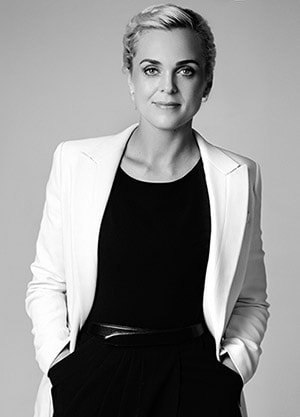
Photo provided by Siri May.
For Siri May, advocating for marginalized communities has been a lesson in humility. When she started working in her early 20s she wanted to change the world, but today she draws on a valuable lesson from Australian Aboriginal activist Lilla Watson: “If you have come here to help me, you are wasting your time. But if you have come because your liberation is bound up with mine, then let us work together.”
“If there is any hint of savior complex when you come from a place of privilege in this work, then you are immediately rendered part of the problem,” May, an Australian native, explained. “The important lesson I continue to grapple with is how to simultaneously represent part of the problem and still participate in the solution.”
May currently works as the United Nations (UN) program coordinator for OutRight Action International, an organization that seeks to advance human rights and opportunities for LGBTIQ (lesbian, gay, bisexual, transgender, intersex and queer) people around the world. She has over 15 years of experience engaging civil society, governments, and the private sector on issues related to social impact and change, public health and human rights. In fact it was her work in the public health arena that led her to return to school for a Masters in Human Rights Law.
“It is difficult to work in HIV and sexual health without bumping up against human right’s based approaches,” May said. “I became seduced by the promise of international human rights law; that everyone is born equal, and it is the obligation of States to upload those principles for their citizens.”
A drive for advocacy
To May working as an advocate is about participating in the world, as well as equal parts learning and contribution. After coming out as a lesbian at age 15, she began to participate in LGBTIQ and social justice communities. She said early in her career she would become discouraged with advocacy work, mainly because she held unrealistic expectations.
“The truth is the work is equal parts inspiring and equal parts hard, and you learn by necessity that it is a marathon and not a sprint,” May said. “You have to appreciate the small wins and realize you are contributing to something for which you may never see a positive outcome in your lifetime. For me, this is what participation in society looks like today.”
May has been at OutRight for almost two years, where she works directly with UN member States, UN institutions, and other civil society organizations to spotlight human rights violations against the LGBTIQ community. She loves that her job is different every day, and when the UN is in session, working 15 hour days can be the norm. OutRight’s UN program is designed to help LGBTIQ activists all over the world access the UN in New York, whether it’s in person during OutRight’s Advocacy Week and UN Fellowship Program, or through representing their voices in UN member State meetings.
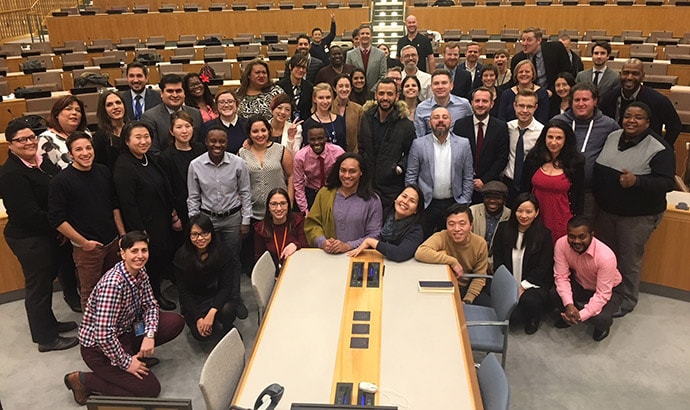
International LGBTIQ Human Rights Defenders at UN Headquarters in December 2017. Photo provided by Siri May.
OutRight is the only LGBTIQ organization with ECOSOC consultative status based at the UN in New York. Obtaining ECOSOC status provides non-governmental organizations with access to the UN system in New York and the various human rights mechanisms in Geneva. May said the competition to be heard among UN member States is made easier by the fact that OutRight works with an intersectional coalition of human rights, peace and security and social justice organizations that help push each other’s agendas forward, and also because not a lot of organizations have the resources or capacity to obtain ECOSOC status and have a seat at the table.
“I feel an immense sense of obligation,” May said. “When I am in those rooms I am representing a very diverse movement. We don’t look at ourselves as leading on issues, we look at ourselves as reflecting on issues prioritized by the activists working on the ground, our work is to amplify national movement building at the international level.”
Future Change
May said change at UN headquarters is slow, but it provides an arena to spotlight some of the grave violations the LGBTIQ community faces across the globe, such as murder, violence, torture, forced marriage, medically unnecessary nonconsensual surgeries including forced sterilization or arbitrary detentions. Often when activists come to the UN it is because they have no other recourse at the State level.

Siri May with her UN colleagues. Photo provided by Siri May.
Two goals May would like to accomplish during her time at OutRight are one, building consensus among UN member States that extrajudicial violence is unacceptable, and two, increasing LGBTIQ activists’ access to the UN system in New York.
“While it doesn’t seem that condemning someone for killing a person extra-judicially for their real or perceived sexual orientation, gender identity or gender expression would be controversial, there is still no consensus on this between UN member States,” May said. “Sometimes it feels like a low benchmark, but we continue to advocate to get to a place where all States agrees that this violence is unacceptable.”
When May looks ten years down the road the only thing she knows for certain is that she still wants to be participating.
To do so, “requires intent, self-reflection and continuous work to remain relevant and useful,” May said. “I would love to look back on my career and feel that I was of service to the collective.”
Back to Top
Welcome New Members
Please welcome our newest Global Washington members. Take a moment to familiarize yourself with their work and consider opportunities for support and collaboration!
Kyle House Group
The Kyle House Group (KHG) provides hands-on and customized consulting services to a diverse portfolio of clients in the non-profit and commercial sectors. KHG operates at the nexus of government and the business and philanthropic communities, where its experienced team of professionals specializes in government relations, commercial advocacy, partnership development, policy analysis, and strategic communications. kylehousegroup.com
Seattle Aquarium
The Seattle Aquarium is the region’s premier resource for hands-on marine experiences and conservation education. The ninth largest aquarium in the U.S. by attendance and among the top five paid visitor attractions in the Puget Sound region, the Seattle Aquarium has hosted over 22 million visitors and provided marine conservation education to over 1.6 million school children. seattleaquarium.org
Back to Top
Member Events
Sept 14: Sahar Education // How Does Design and the Built Environment Impact Global Education?
Sept 22: Spreeha Foundation // Spreeha Journey of Hope 2018 Fundraiser
Oct 5: Schools for Salone // 8th Annual Seattle Gala!
Oct 6: Path from Poverty // Harambee Gala – An Evening of Providing Hope
Oct 23: Peace Trees Vietnam // 23rd Anniversary Luncheon
Oct 27: Mission Africa // Mission Africa Benefit Luncheon 2018
Back to Top
Career Center
Junior Accountant Landesa
Administrative Assistant Snow Leopard Trust
Human Resources Generalist The Max Foundation
Employee Engagement and Workplace Giving Officer Mercy Corps
Chief Learning Officer Planned Parenthood of the Great Northwest and the Hawaiian Islands
Check out the GlobalWA Job Board for the latest openings.
Back to Top
GlobalWA Events
October 9: Feeding the World in a Changing Climate
October 17: Voices from the Field: Suyheang Kry, Cambodia’s Women Peace Makers
December 6: GlobalWA Annual Conference Early Bird pricing ends soon!
Back to Top
Welcome to the August 2018 issue of the Global Washington newsletter.
IN THIS ISSUE
Letter from our Executive Director

We don’t often think about how the design of a space affects our behavior. But the impact can be profound.
When I was in college, I spent a semester abroad, studying in the Dominican Republic. I remember being stunned by the gorgeous gardens scattered throughout the campus and the various tucked away places where students could gather and study.
The classrooms, by comparison, felt cold and stark with their bare walls of whitewashed concrete. The emphasis of the open air design clearly reflected a preference for studying outside – which we happily did. Indeed, several people I met there told me how sorry they felt for us Americans, always being indoors!
In this month’s newsletter we’re exploring the topic of education from an unexpected angle – design.
When I first heard about GlobalWA member Sahar Education’s plan to design and build a school for girls in Afghanistan that was environmentally sustainable, I’ll admit my first thought was – how extravagant! I was soon to learn that the cost of building something basic out of concrete slabs isn’t much cheaper than applying more thoughtful design practices.
In fact, the design Sahar came up with, in collaboration with their Afghan team and local Seattle architecture firm Miller Hull, incorporates low-tech climate solutions that store and release solar energy throughout the day. The approach offers cost-savings as well as greater comfort all year long. Not only will the school provide a safe space for the girls to learn, but it will be a space that respects and encourages their potential – a place where they can thrive.
All of our members that focus on improving education quality and access in the developing world work closely with the communities they serve. Our member buildOn, also profiled in this month’s newsletter, has built 1,323 schools around the world. All are locally-appropriate designs, and building materials are sourced locally, as well.
August is always a good time to reflect on the environment around us, both indoors and outdoors, and how it can open our minds to new ideas. In the articles below, find out how GlobalWA members are improving lives through the built environment, and I hope you’ll join me on August 28 for an event to learn how Sahar’s new boarding school will complement its successful early marriage prevention program.

Kristen Dailey
Executive Director
Back to Top
Issue Brief
Can Better School Design Improve Educational Quality in the Developing World?
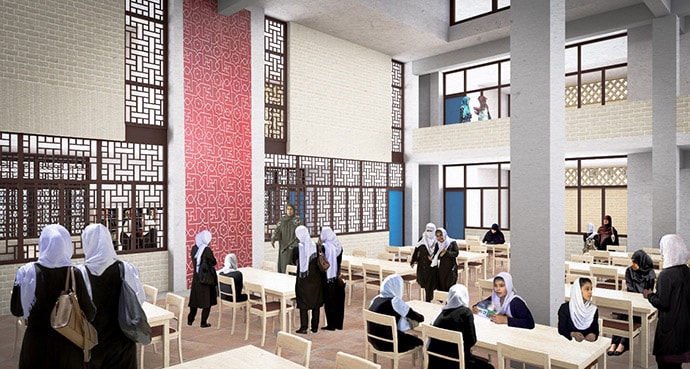
Artist rendering of public boarding school to be built by Sahar Education in Mazar-i-Sharif, Afghanistan. Image credit: Miller Hull Partnerships LLC.
Over the last decade and a half there have been tremendous gains in global education enrollment. Nevertheless in 2014 the United Nations reported there that while more children than ever are going to school, many are not getting the basic reading and math skills they will need to escape poverty. In part this is due to a shortage of trained teachers, but it is also a result of the poor physical condition of many schools. The majority of schools in sub-Saharan Africa, for example, do not have access to electricity or potable water.
In order for the world to achieve inclusive and equitable quality education for all (Sustainable Development Goal 4), development practitioners are stepping up their game, particularly in sub-Saharan Africa and Southern Asia. In addition, the global development community is focused on specific populations needing special attention, including refugee children, persons with disabilities, and those living in rural areas.
Redesigning the Physical Space.
While new technology may offer some a vision of education untethered to place, others are examining ways to redesign the built environment to improve the quality of learning outcomes.
A study published in Building and Environment in 2013 reviewed learning rates and classroom design in seven UK schools over the course of a year. Researchers evaluated the classroom environment along multiple design parameters, including classroom orientation, natural light and noise, temperature and air quality, as well as flexibility of space, storage facilities, and even the use of color. What they found was extraordinary – fully 73% of the variation in student performance, driven at the class level, could be explained by the physical environment.
Redesigning the built environment presents a unique challenge, given the wide range of factors that contribute to the human experience in a particular space. What we do know, is that great designs often begin with listening.
In a forward to the book, Design for Good: A New Era of Architecture for Everyone, by John Cary, Melinda Gates talked about her experience at Microsoft, and how she learned to appreciate the value of listening to fully understand customer needs in order to design more user-friendly software.
When it comes to the built environment, it is important both to listen to what people say, as well as observe their behavior in a given space. In describing her visit to a clinic in Haiti run by Paul Farmer, a physician who co-founded Partners in Health, Gates recalled that as she approached the clinic, she saw a beautiful garden growing outside the clinic. Farmer explained to her how he had planted the garden to provide a place where his patients could rest in the shade while they awaited care.
That seemingly small act, Gates felt, reflected Farmer’s principled refusal to compromise when it came to his patients’ needs. Indeed, she says, “He wanted them to be empowered to expect more for themselves.”
When it comes to providing quality and inclusive education for all, there’s no reason that schools cannot be designed to be safe and functional, as well as beautiful and inviting places for young people to learn. Indeed, the right school design can be all of these things, and stay within budget.
Global Washington member, Sahar Education, is getting ready to build a new boarding school for girls in Afghanistan. Ginna Brelsford, executive director at Sahar, and her team worked closely with Seattle architectural firm Miller Hull on the design.
“We’ve been thinking a lot about how design promotes learning, especially in a conflict zone,” Brelsford said. “How does one build in an area of extreme poverty, and create a beautiful, safe space for girls to learn?”
As it turns out, the cost of building the new school from “ugly concrete slabs” as opposed to the exquisite architectural design they came up with was not much higher, according to Brelsford. But the students’ experience in such a learning environment will be incalculable.
###
The following Global Washington members promote and support a more dignified, safe and inclusive educational experience for children, youth, and adults across the developing world.
Ashesi University Foundation
Ashesi University Foundation mobilizes support for Ashesi University in Ghana. Ashesi’s mission is to educate a new generation of ethical and entrepreneurial leaders in Africa and cultivate within its students the critical thinking skills, concern for others and courage it will take to transform their continent. Founded in 2002 by Ghanaian Patrick Awuah, Ashesi offers majors in Computer Science, Business Administration, MIS, and Engineering, all grounded in a liberal arts core curriculum. Ashesi plans to broaden its impact by growing to 1,000 students by 2020 and adding new programs, while maintaining their strong culture of ethics and critical thinking.
Bo M. Karlsson Foundation
Founded in 2004, the Bo M. Karlsson Foundation (BMKF) awards higher education scholarships to underprivileged women in Nepal. Over the past decade, BMKF has awarded scholarships to 45 young women who have gone on to pursue careers in accounting, business management, engineering, journalism, law, medicine, nursing, public health, rural development, social work and teaching. As the majority of BMKF scholars come from remote villages, most are the first in their families to receive any education. Several scholars have a physical disability, belong to marginalized castes or ethnic groups, or have experienced harrowing civil war and human trafficking situations. All share a passion for education. BMKF is committed to helping them succeed.
BuildOn
For two decades buildOn has mobilized rural communities in some of the economically poorest countries on the planet. The organization builds schools with villages that lack adequate classrooms – where students learn in huts, are taught under trees, or walk miles to a neighboring villages. Or don’t go to school at all. To date, buildOn has built 1,323 schools internationally.
Construction for Change
Construction for Change partners with organizations that provide life-changing resources but have outgrown their current facilities or want to expand the services they offer. It designs buildings that match the needs of the people who use them, because great work is even better in great spaces. Construction for Change builds to last; its facilities meet the highest standards of safety and durability. Through natural disasters, time, and difficult environmental conditions, its structures stay standing to provide space for positive change.
Mission Africa
Mission Africa believes that education is the key to ending generational poverty and that investment in education can have a profound impact on communities. Many African countries do not offer free education and Mission Africa is dedicated to ensuring that all children regardless of their income level have access to quality education. In the past ten years, Mission Africa’s academic scholarship program has awarded 795 scholarships and has allowed more than 300 students in rural villages in Nigeria, Tanzania, Kenya, Sierra Leone, Togo, Rwanda and Uganda to graduate high school and continue on to college or vocational training. Mission Africa has also shipped 10 40-foot containers filled with books and school supplies to children and families in Nigeria, Kenya and Tanzania.
Mona Foundation
Since its founding in 1999, Mona Foundation has had a simple but compelling goal — to support grassroots educational initiatives that build stronger and more sustainable communities and ultimately alleviate poverty. Mona partners with organizations that work to reduce the barriers to education, improve quality of learning and cultivate agency of the individual. The foundation’s programs use an integrated approach to develop academic skills, and creative and moral capabilities, to transform young people into agents of change in service to their families and communities. Mona Foundation has awarded more than $12 million to 38 initiatives in 18 countries, providing access to quality education and training for more than 258,000 students, teachers and parents annually.
NPH USA
NPH USA supports Nuestros Pequeños Hermanos (Spanish for “Our Little Brothers and Sisters”) which is raising more than 3,400 orphaned, abandoned and disadvantaged boys and girls in Bolivia, the Dominican Republic, El Salvador, Guatemala, Haiti, Honduras, Mexico, Nicaragua and Peru. NPH believes that a quality education is the key to a better life. Many children arrive at NPH with little or no formal schooling. Each child is given a strong foundation of basic academic and interpersonal skills and provided with an extensive variety of educational opportunities. Nearly all of NPH homes feature on-site schools from Montessori preschool through middle or high school, as well as vocational trade certification courses. In 2015, NPH supported 369 students in university – the most in the organization’s history. An additional 2,100 children who live in low income areas outside the homes receive scholarships to attend NPH schools.
Rwanda Girls Initiative
Rwanda Girls Initiative’s mission is to educate and empower girls in Rwanda to reach their highest potential. The organization’s vision is for students to graduate as inspired young leaders, filled with confidence, a love of learning and a sense of economic empowerment to strengthen their communities and foster Rwanda’s growth. The Gashora Girls Academy of Science and Technology (GGAST) is an innovative and socio-economically diverse model upper-secondary STEM school designed to provide a “whole girl” education. GGAST provides a rigorous college prep academic program, combined with leadership training and extra-curricular activities that fills girls with confidence so they can pursue their dreams of university education and impactful vocations. Since opening GGAST’s doors in January 2011, Rwanda Girls Initiative has educated 270 girls each year with a 93 percent matriculation rate to universities in 16 countries, including 153 in the U.S. and Canada with over $30 million in scholarships.
Sahar Education
Sahar provides access to education in Afghanistan and supports an educated future for Afghan girls, enabling them to actively participate in social, political and economic arenas in their communities. Sahar builds schools, computer centers and teacher training programs, utilizing local labor and community support. Since 2009, Sahar has invested over $2 million in building, repairing and supplying schools in Afghanistan, a country in which 45 percent of schools operate without adequate buildings. Sahar operates 13 schools, 9 rural and 4 urban, and 87 classrooms have been built or renovated. Sahar impacts 20,000 girls annually and serves girls from Uzbek, Tajik, Pashto and Hazar ethnic groups. In total, Sahar’s programs have impacted more than 200,000 girls.
Schools for Salone
Schools for Salone is a non-profit that revitalizes Sierra Leonean communities, empowers children and improves socioeconomic conditions for families, communities and future generations. The organization improves access to and quality of education, and has built 18 schools and three libraries since 2005. Schools for Salone also trains teachers at intensive summer institutes. With a proven track record of working with Sierra Leoneans as they rebuild after a ten-year civil war, the organization builds new schools within three months after funds are raised. Through opportunities that only an education can provide, Schools for Salone strives to break the cycle of poverty, one school at a time.
Spreeha
Spreeha empowers underprivileged people by providing healthcare, education, and skills training. Spreeha’s work in the Rohingya refugee camps in Bangladesh builds on its core values of empathy, creativity, lean methodology, continuous learning, and partnership. The objective is to create longer term positive changes like healthcare and education for women and children. In most cases, those being served are pregnant and rape victims or children who have been orphaned. Spreeha’s early childhood development centers aim to create a safe and supportive learning environment for the refugee children with pre-school education. Spreeha strives to create lasting impacts on the lives of those who are in the most difficult of situations.
Back to Top
Organization Profile
Sahar Education
By Natalie Slivinski
In Afghanistan, the Taliban has had a devastating effect on girls’ education. During their rule, hundreds of girls’ schools were shut down, and many destroyed, displacing hundreds of thousands of students. In rural areas, poverty-stricken families cannot afford transportation to remaining schools, and the long walk often takes girls through dangerous territory. When girls reach high school age, and must walk even further distances, sometimes directly through conflict zones, many fathers forbid them from continuing their education. As a result, girls are massively under-represented in schools. According to UNICEF, only a third of Afghan girls aged 12-15 attend school, compared to 60 percent of boys that age.
Furthermore, when Taliban rule prevents girls from attending high school, this leaves a missing generation of students who would normally have become teachers. There is a religious and cultural idea that once girls reach womanhood, they should no longer be taught by men. So, as the next generation of girls approaches high school, there are no female teachers to teach them. Again, their education is truncated. In the midst of Taliban resurgence, existing female teachers are barely ahead of their students. The blind are leading the blind.
But what if rural girls in Afghanistan had access to a safe boarding school setting, where they could learn real-world skills from trained female teachers?
Sahar Education—in collaboration with the architectural firm Miller Hull, the University of Washington’s Department of Architecture, and the Afghan Ministry of Education—aims to find out.
The award-winning collaborative group is dedicated to revolutionizing education for Afghan girls. In addition to providing teacher training and early marriage prevention, since 2001 Sahar has worked on 25 schools and educated over 250,000 girls. Earlier this summer, their 2015 project on the Gawhar Khatoon Girls’ School in Mazar-i-Sharif won the American Institute of Architects (AIA) Honor Award, the highest recognition of excellence in architecture.
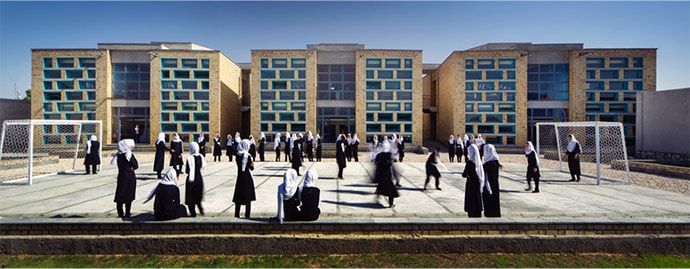
Students at Gawhar Khatoon Girls’ School in Mazar-i-Sharif in 2015. Photo credit: Nic Lehoux
Now, they’ve embarked on an unprecedented project: a public boarding school, adjacent to the Sultan Razia Girls’ School, also in Mazar-i-Sharif. The school will provide sorely-needed access to education for rural girls in conflict zones.
“There are no public boarding schools in the whole nation, so this is a pretty cutting-edge idea,” says Ginna Brelsford, executive director at Sahar. “If your daughters are not able to finish their high school education, and they’re in a conflict zone, and you have the Taliban and ISIS barking at your door, those are pretty strong motivators [for parents],” Brelsford says.
Sahar recognizes the critical importance of teaching girls life skills in such a harsh environment. Mothers often have rug businesses, for example. “The daughter will learn enough math that she can actually calculate the proceeds and help mom understand if she’s not charging enough,” Brelsford says. “Because the poverty is so dire—and after 40 years of nothing but war, it is unbelievable—I think dads understand what can happen financially for the family if the daughter learns computer skills, and can get a job and bring money home. [When you’re illiterate], you can’t even read a medicine bottle; when you educate a girl, and she’s in a family of 11 illiterate people, that one girl is going to make a huge difference.
“Sahar has contributed to the earning power of these young women.”
On collaboration
Collaboration is a critical strategy for the group—both with each other and with the Afghan community.
Sahar has a long partnership with UW and Miller Hull. Bob Hull, who passed away in 2014, was a world-renowned architect who joined the Peace Corps in Afghanistan in 1968. With his expertise and Afghan roots, plus funding from the Janet Wright Ketcham Foundation and support from UW Professor Elizabeth Golden, a design studio was formed for architecture students. The mission: to build schools in Afghanistan.
The group, who joined forces with the Afghan Ministry of Education, was united by a passion for girls’ education. One important approach, from the beginning, was to involve the students themselves. “The first thing Elizabeth Golden said was to put a pen in the hands of those girls and have them draw their dream. And I will never forget hearing that from her,” says Brelsford.
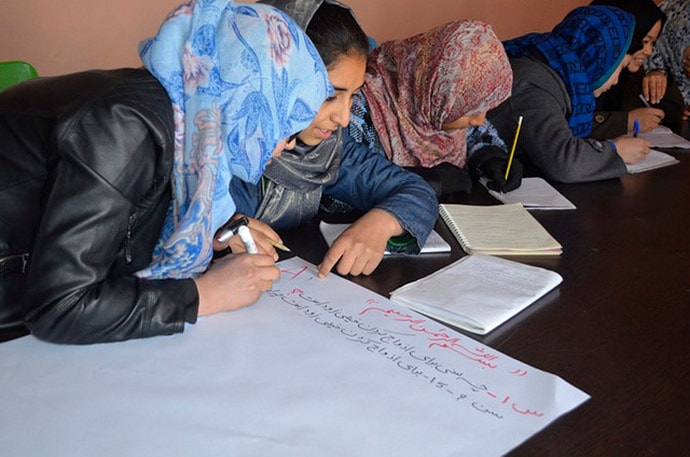
Sahar Education students take part in an early marriage prevention program. Photo credit: Sahar Education.
The team learned surprising things early on—the girls wanted a volleyball court, a medical clinic, even a place to skateboard. “You go to the community, you engage them, and you ask them what they want. And then you pull it back out and use your skill as an architect [to build it]. I think we’ve learned that lesson, so we do that as part of our process.”
On the importance of architecture
The mission for the Sultan Razia boarding school is to provide a safe, beautiful, reliable, and green school environment for rural girls. Architectural design is a key factor.
“This is a unique project,” says Dave Miller, founding partner of Miller Hull. “What we’re trying to achieve with the architecture is basic elements of providing for human comfort. Things like good daylight, which has benefits to mental health and learning; good air quality and air flow, so that the rooms feel like a healthy environment and are comfortable for learning. But equally important are social spaces, where students can enjoy each other’s company, where they’re secure, and can learn from each other and build on each other’s experiences.”
Miller describes the building almost as a ship, with moving parts and design elements that work in harmony with the extreme weather instead of fighting against it. Opening and closing windows, for example, becomes a science. “Our people on the ground in Mazar are able to give training and orientation to teachers and student leaders so that they understand how the building works.
“We call it ‘sailing the building.’”
The UW architecture students use largely non-mechanical, power-independent techniques, which have worked for centuries in Afghanistan. For instance, by precisely orienting the building to the sun, the girls can be comfortable year-round without heating or air conditioning, which are unreliable and expensive. By using wind chimneys and wind tunnels, the building can harness the breeze as a cooling mechanism. “These passive systems are working really well in the Gawhar project,” Miller says. “And that’s really satisfying.”
The biggest architectural challenge, however, is the residential component. Mechanical and equipment-heavy spaces like kitchens and bathrooms are more expensive. Furthermore, designing dorms, where girls will live around the clock, is a much bigger endeavor than designing classrooms.
At one point, for example, after making considerable progress on the school’s design, an unexpected challenge arose: students’ privacy. “Parents won’t feel comfortable with their daughters going to this school if they think men will be able to see them from the street,” says Miller. “It’s such a critical cultural pattern.”
The team had to go back to the drawing board. “That really came through loud and clear, and we were actually pretty far along with the design by the time we learned how important that was,” he says. “Being able to exactly get the windows in the right place, so that we get the ventilation and the light, but we don’t get views from certain areas of the city, is certainly a big challenge.”
Funding a world-changing idea
Brelsford says the biggest challenge is funding. Prior projects had the generosity of the Ketcham Foundation. Now, Sahar is forging a campaign trail, communicating their mission to private donors—and this is a formidable task.
“There’s the challenge of conveying that this is a safe enough project, a safe enough space, for you [the donor] to trust me with your money, even though it’s a war zone. Even though it’s a country with a lot of corruption,” she says. “But we need at least $1.5 – 2 million to replicate an amazing set of schools, which we’ve already demonstrated that we can build, and we are the organization to change that country’s landscape of schools. I know we are, because we’ve already done it.
“We know the physical space we create is the best in the world. The system works.”
On looking to the future: The 10-year-plan
Despite the challenges, Sahar, Miller Hull, and UW are driven by their mission to revolutionize girls’ education in Afghanistan—and, eventually, in harsh environments throughout the world.
“From an architectural point of view,” Miller says, “[The goal is] making sure that it is replicable. The design elements are modular so that you can adjust size and adaptability for different sites. Creating a flexible, adaptable, replicable design—that’s how we’re going to carry this forward.”
As for Brelsford, “I want to be known as the go-to organization for providing safe, sustainably designed, beautiful spaces in Afghanistan and other countries for girls’ education. That is our niche, and that’s what we’re delivering.
“It’s not an overnight process when you’re going up against the resurgence of the Taliban and ISIS. It’s step-by-step, day-by-day. But that’s how change happens,” she says. “We’re putting the power of a pen and a computer in the hands of girls. That’s our strategy. That’s our dream.”
Back to Top
Changemaker
Randi Hedin, Director on the National Board of buildOn
By Arielle Dreher
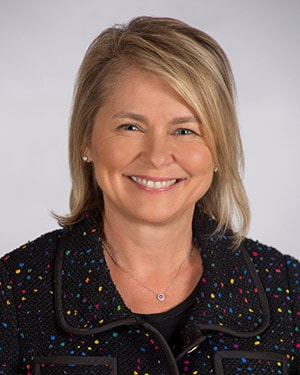
Image provided by Randi Hedin.
Randi Hedin remembers staying in a remote village in Senegal in 2013. The village was in the midst of a desert-like environment with little vegetation around. The schoolhouse was a small hut made of millet. It was very dark inside the classroom with no windows, so teachers often took their students outside to the few available trees to learn with light and shade.
One morning, Hedin came upon some cows munching on the school. She was surprised and snapped a few pictures. She asked her host family about it later.
“They said, ‘Yeah, between the animals and the rains that come during the rainy season, this is the problem they have with their school,’” Hedin recalls.
This is where Hedin’s work with buildOn comes in. Hedin was in Senegal because the nonprofit was building a new school in the village, one that would not have to be rebuilt after every rainy season or every time a cow got hungry.
buildOn works in seven countries around the world, as well as in the U.S., to build schools in collaboration and coordination with the local ministries of education and community leaders. So far, the organization has built 1,323 schools internationally. For Hedin, the work buildOn does aligns with her belief that education is the foundation for opportunity.
“In a house or in a school, it’s the foundation, and I firmly believe that, and once armed with that I think there are a lot of opportunities that open up,” she says.
Education has to begin with a conducive learning environment, however, and in places like Senegal and Haiti, where Hedin has also visited, something as common as a bad storm can cancel classes.
“Kids miss school if something happens with the school that they can’t get their lessons,” Hedin says. “So for example, the Haitian community I was in was so excited about having this brand new building dedicated to the kids, that it’s a school, not a community center or a church or a meeting place, it’s first and foremost a school.”
Hedin joined the national board of buildOn in 2009. She first heard about the organization a decade earlier when she was living and working in the New York City-area as a securities and corporate law attorney. Her firm had a table at the buildOn annual gala, where she heard Jim Ziolkowski, buildOn’s president and CEO, speak for the first time. She said he was, and still is, a mesmerizing storyteller—and she knew she wanted to get involved eventually.
“Much later on, I started to really learn about the depths of poverty in many of these countries around the world,” she says.
She thought at the time, “If I ever in my life have time to get involved with this organization, I would love to be a part of the solution because education transforms lives, and it sounds a little hokey, but you see it here in the U.S. and you see it everywhere around the world,” she says.
In 2008, Hedin and her family moved to the Seattle area, opting for a change of pace from the East Coast. Hedin left her corporate firm job and now is co-president of RPX Research, as well as a lecturer in the University of Washington Law School’s Sustainable International Development program. Joining the buildOn board pushed Hedin to use her law background to better understand the challenges the organization faces in different countries. In fact, before she started lecturing, she went back to school to get her master’s degree in the Sustainable International Development program.
“My knowledge of the world and my knowledge of outside our Western world has exponentially increased, and I think that buildOn has much to do with that,” she says.
As a board member, she has traveled to all seven countries (Senegal, Malawi, Mali, Burkina Faso, Nepal, Haiti and Nicaragua) that buildOn has schools in globally. Hedin really believes that the buildOn model of community engagement sets it apart from other organizations. The nonprofit does a good job avoiding “mission creep,” Hedin says, by solely focusing on building physical schools (usually with latrines) for communities.
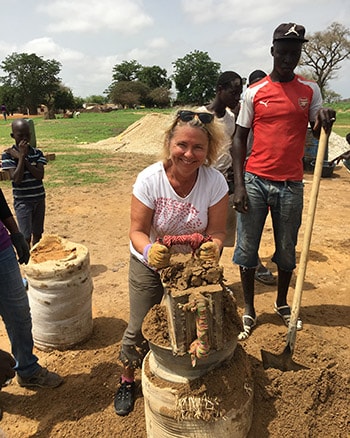
Hedin making bricks in Senegal, 2016. Image provided by Randi Hedin.
When buildOn enters a community—usually in a rural part of the country— its staff establishes a partnership between the country’s ministry of education, the community itself and buildOn. The ministry of education supplies the books, curriculum, teachers and desks for the classroom, and local community members are responsible for providing some of the locally-sourced materials needed to build the school, such as water and gravel, supplying non-skilled volunteers to help build the school, and electing a leadership team of equal numbers of men and women to oversee the school construction.
buildOn is really there to create structure in the community and provide the monetary resources and certain supplies to build the physical school. One requirement of each leadership team and school that the nonprofit builds is that it must include equal numbers of men and women, boys and girls.
“In many of these places where we build, women don’t have, necessarily, decision-making power, and here on these committees they do,” Hedin says. “It’s a game-changer.”
In some of its countries, buildOn also pays for an instructor to teach adult literacy classes at night in their schools. Hedin remembers one woman, the wife of the local principal in a community in Malawi, who was excited about the opportunities for her children and for herself to be able to learn marketing and negotiation skills.
“She really wanted to make sure that her girls, as well as her boys, had a good school too, so that they could have a better life than she has,” Hedin recalls. buildOn also hires local men and women in each country to work for the organization.
Hedin, who lives in Woodinville with her husband, will have an empty nest this fall, and she envisions taking her law background, as well as her new master’s degree, and getting more deeply involved with buildOn’s work, along with other projects. She currently does fundraising for the organization in Seattle, as well as some governance work for them. In the last decade fundraising in Seattle enabled buildOn to build nearly 20 schools, Hedin says. buildOn is a 27-year-old organization, and Hedin said she believes that they do not plan to expand to other countries right now—opting instead to go deeper in the countries they are in, continuing to build more schools.
“We really are getting to as many communities as we possibly can, and I like that because I think that’s when you’re going to see literacy rates rise,” Hedin says. “You are going to see growth in economic development and see all those things that come as a result of education that will all improve for those countries.”
The countries buildOn works in rank low on the Human Development Index, and ultimately, the goal would be for buildOn to have raised literacy rates in those countries and not need to build any more schools.
“That could be a great goal—to move on to other countries where the needs remain and are the greatest,” Hedin says.
Hedin will be hosting a Seattle fundraiser for buildOn at her home on Thursday, November 1. To request an invitation, email randi.hedin@gmail.com.
Back to Top
Welcome New Members
Please welcome our newest Global Washington members. Take a moment to familiarize yourself with their work and consider opportunities for support and collaboration!
EKARI Foundation
EKARI is a community-based nonprofit organization, supporting education and community development in the Phalombe district of Malawi, Africa. EKARI believes in empowering the future generations of Malawi to emerge from poverty through their own efforts by providing access to quality and relevant education, coupled with the necessary educational resources and training to assist communities in establishing and celebrating sustainable livelihoods. ekarifoundation.org
PRONTO International
PRONTO International aims to optimize care during birth. The organization develops and implements innovative training strategies that act as a catalyst for health care providers to make individual, team, and systems changes. PRONTO envisions birth as a safe and respectful experience for all mothers, babies, and healthcare providers. prontointernational.org
Robert Paetz Photography
NGO and humanitarian photographer. robertpaetz.com
Back to Top
Member Events
August 17-22: The Max Foundation // The Max Global Experience – Uganda
August 18: Days for Girls // Girls Soar 2018
August 21: Global Partnerships and Capria // Impact Investing Summer Happy Hour
August 26: Water1st International // Bike for Water
Back to Top
Career Center
Monitoring and Evaluation Advisor Amplio Network
Director of Social Entrepreneurship Days for Girls
Fall & Winter Internships World Affairs Council
Check out the GlobalWA Job Board for the latest openings.
Back to Top
GlobalWA Events
August 28: Building Their Future: How Girls’ Schools in Afghanistan Are Preventing Early Marriage
October 9: Feeding the World in a Changing Climate
October 17: Voices from the Field: Suyheang Kry, Cambodia’s Women Peace Makers
Back to Top
